On today's episode of The Late Sub, host Claire Watkins dives into basketball. She kicks things off with a look at the first WNBA expansion draft since 2008, when the Golden State Valkyries selected 11 players from around the league to build their inaugural 2025 roster.
Pivoting to the college court, Watson chats through No. 3 South Carolina's winning week, zeroing in on how the defending national champions dominated two Top-10 teams.
Finally, Watkins takes a trip around the sports world, discussing NWSL free agency, NCAA soccer's College Cup, NCAA volleyball, PWHL hockey, and more.
The Late Sub with Claire Watkins brings you the latest news and freshest takes in women’s sports. This is the weekly rundown you’ve been missing, covering the USWNT, NWSL, WNBA, college hoops, and whatever else is popping off in women’s sports each week. Special guest appearances with the biggest names in women’s sports make The Late Sub a must-listen for every fan. Follow Claire on X/Twitter @ScoutRipley and subscribe to the Just Women’s Sports newsletter for more.
Subscribe to The Late Sub to never miss an episode.
UNC won their 22nd NCAA soccer title last night, beating Wake Forest 1-0 to lift the 2024 College Cup and end the Tar Heels' 12-year championship drought.
After a first half spent largely chasing the Demon Deacons, who outshot UNC 5-1 in that time frame, North Carolina broke through in the 62nd minute after a curling free kick from sophomore Olivia Thomas banged into the side netting.
Thomas, who only scored five regular-season goals after spending a large portion of 2024 nursing a hamstring injury, hit the gas in the postseason, ultimately tallying four goals in the NCAA tournament.
Her championship-winning strike earned Thomas the 2024 College Cup’s Most Outstanding Offensive Player award, while UNC goalkeeper Clare Gagne's trio of saves in last night's match snagged her Most Outstanding Defensive Player honors.
A dynasty revived and a new UNC coach welcomed
With last night's victory, the UNC women's soccer dynasty once again owns more NCAA soccer hardware than all other Division I programs combined, an accomplishment made even more impressive by the hurdles the Tar Heels faced in their 2024 campaign.
After 45 years as head coach, UNC's program founder Anson Dorrance retired four days before this season's kick-off. Longtime associate coach Damon Nahas was handed the interim reins, stepping in to helm the now-champion squad.
On top of the late coaching swap, the Tar Heels were still reeling from a 2023 mass exodus in which 11 players turned pro and nine transferred out of Chapel Hill.
"We call it the great migration," remarked Thomas after the win. "Transfers came in, club players came up, and we all just meshed together so well… It could've gone any direction [but] here we are and we won it all."
Last night's trophy was ultimately both a retirement gift to Dorrance and a welcome present to Nahas, who received the official nod for the permanent head coaching position just hours before the championship match.
Nahas, who now just needs approval from the UNC Board of Trustees before signing his contract, remains steadfast that the job is merely icing on this season's cake.
"This is a unique season of an extraordinary accomplishment from a group of 27 girls that most people would never have gambled on," Nahas said about his team. "I just love coaching them."
"This national championship is... a greater gift than the head coaching position here at North Carolina. I get to share this with them for the rest of our lives."
The 2024 NCAA DI Soccer Championship field is officially set, with 64 teams gearing up to battle for postseason glory in this weekend's first round.
All teams have their sights set on this year's College Cup — NCAA soccer's Final Four — which will take place in Cary, NC, with semifinals on December 6th before the December 9th championship match.
Along with the 30 conference tournament champions who automatically received postseason invites, the NCAA committee revealed its 34 selectees in Monday's bracket release. The top 32 teams are seeded one through eight in their respective bracket quadrants, and teams are guaranteed to only face non-conference opponents through the tournament's second round.
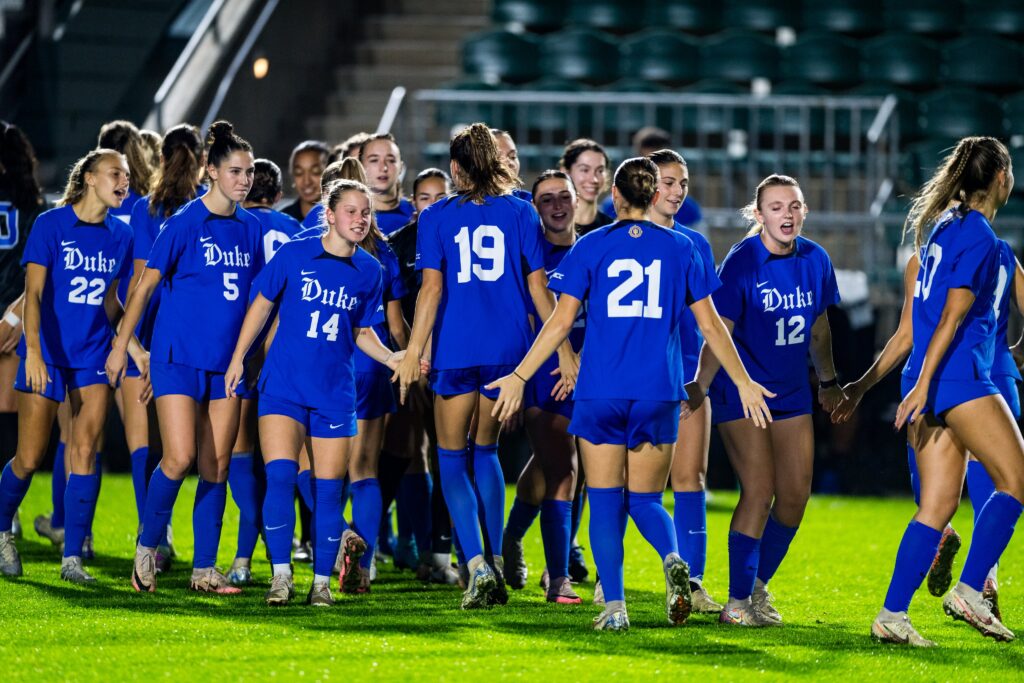
Tight race for top seeds reflect NCAA talent
In this 43rd edition of the NCAA championship, three of the four No. 1 seeds are already making history.
After finishing the the regular season atop the sport's rankings, Duke is the tournament's overall No. 1 team for the first time ever. The Blue Devils, who boast the nation's second-best scoring offense, are aiming for a program-first national title this year.
Joining Duke in the bracket's elite echelon are USC and Mississippi State, who claimed No. 1 seeds for the first time ever. The Trojans did so in their first season as a Big Ten team, while the SEC veteran Bulldogs put together their best year yet, finishing with a nationally unparalleled 16-1-0 regular-season record.
Rounding out the top quartet is defending champion Florida State, the lone consistent standby in the No. 1-seed club. The Seminoles have earned the honor 12 times, with this year marking their sixth straight NCAA tournament atop a quadrant.
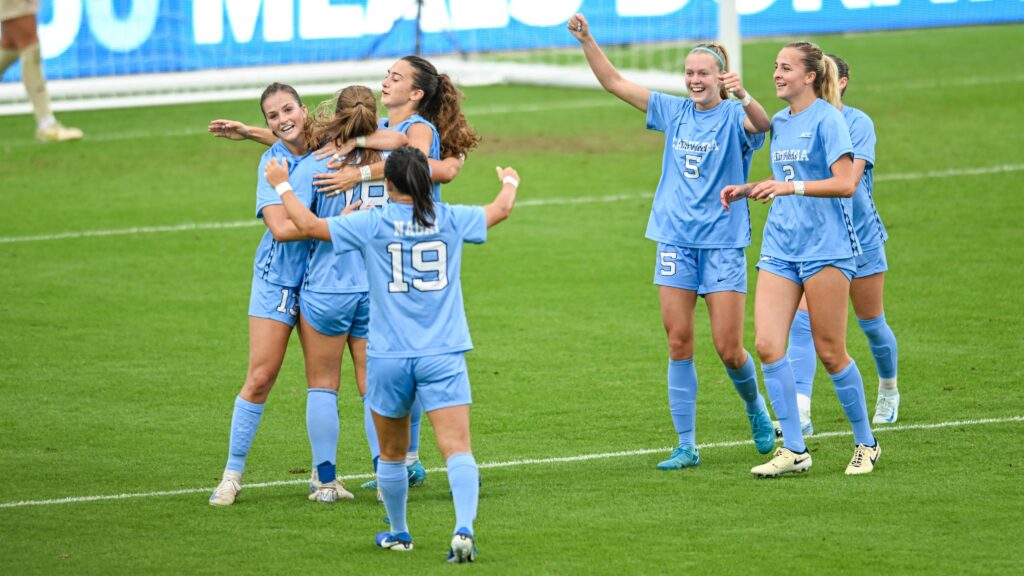
Power Four squads lead NCAA Championship charge
Unsurprisingly, the Power Four conferences comprise over half the national bracket. The SEC and Big Ten lead the charge with 10 teams each, while the ACC has nine in the mix, and the Big 12 is sending seven.
Though the ACC didn't win the total team race, the tough conference is still arguably the one to beat in the bracket, as seven of their teams earned Top-4 seedings. Even more, a full half of the eight Nos. 1 and 2 teams hail from the ACC, with second-seeds North Carolina and Wake Forest joining top seeds Duke and Florida State.
UNC and Wake Forest represent two very different paths to the tournament: The Tar Heels — a dynasty who've won 21 of the 42 national trophies — extended their streak of appearing in every single NCAA tournament with Monday's bracket drop. Meanwhile, the Demon Deacons have shot to national acclaim after failing to garner an invite to last year's NCAA party.
Joining the ACC pair as No. 2 seeds are SEC standouts Arkansas and 2022 national champions and new Big Ten members UCLA. The Razorbacks claim their third No. 2 seed in four years, while the Bruins' defense is on a hunt to prove that defense wins championships.
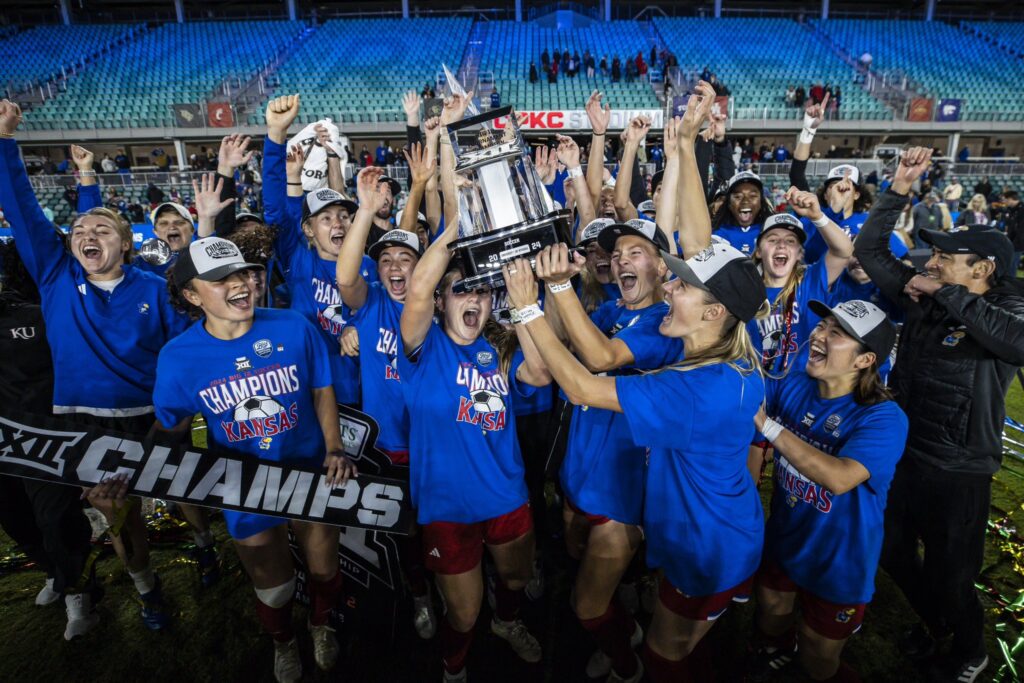
Parity set to increase NCAA tournament chaos
Though the top contenders have certainly earned respect, this season's competition is particularly fierce, as the fallout of conference realignment and unrestricted transfers has meant increased parity on the NCAA pitch.
That parity isn't just reflected by new teams claiming top national seeds. This postseason has already proved that almost any team can emerge victorious from the college soccer pitch at any time.
In last week's Power Four conference tournaments, for example, only the Big 12 saw the top conference seed advance to the final, and none ultimately lifted hardware: UCLA claimed the Big Ten as the No. 2 seed, No. 3 seeds Florida State and Texas won the ACC and SEC tournaments, respectively, and Kansas absolutely stunned the Big 12 as the conference's No. 6 seed champions.
How to watch the NCAA Soccer Championship tournament
Those parity-fueled upsets will be increasingly likely in the tournament's later rounds, but several of the 32 first-round matchups have upset potential.
All will stream on ESPN+, starting with the NCAA's kickoff match between No. 8 Utah State and Washington on Friday at 4 PM ET.
Friday will see 25 matches, with six on Saturday. Wrapping up the tournament's first chapter will be No. 1 USC, who will host Sacramento State at 5 PM ET on Sunday.
With college soccer's regular season officially in the books, DI teams around the country are now competing for conference tournament titles and the NCAA championship bids they guarantee.
Each of Division I's 30 conferences automatically send their tournament winner to the NCAA championship pool, with the rest of the 64-team national bracket decided by the governing body's selection committee by Monday afternoon.
The toughest tickets to grab are in the Power Four conferences, which currently house 20 of the Top 25 ranked teams while fresh faces breathe new drama into some established title contests.
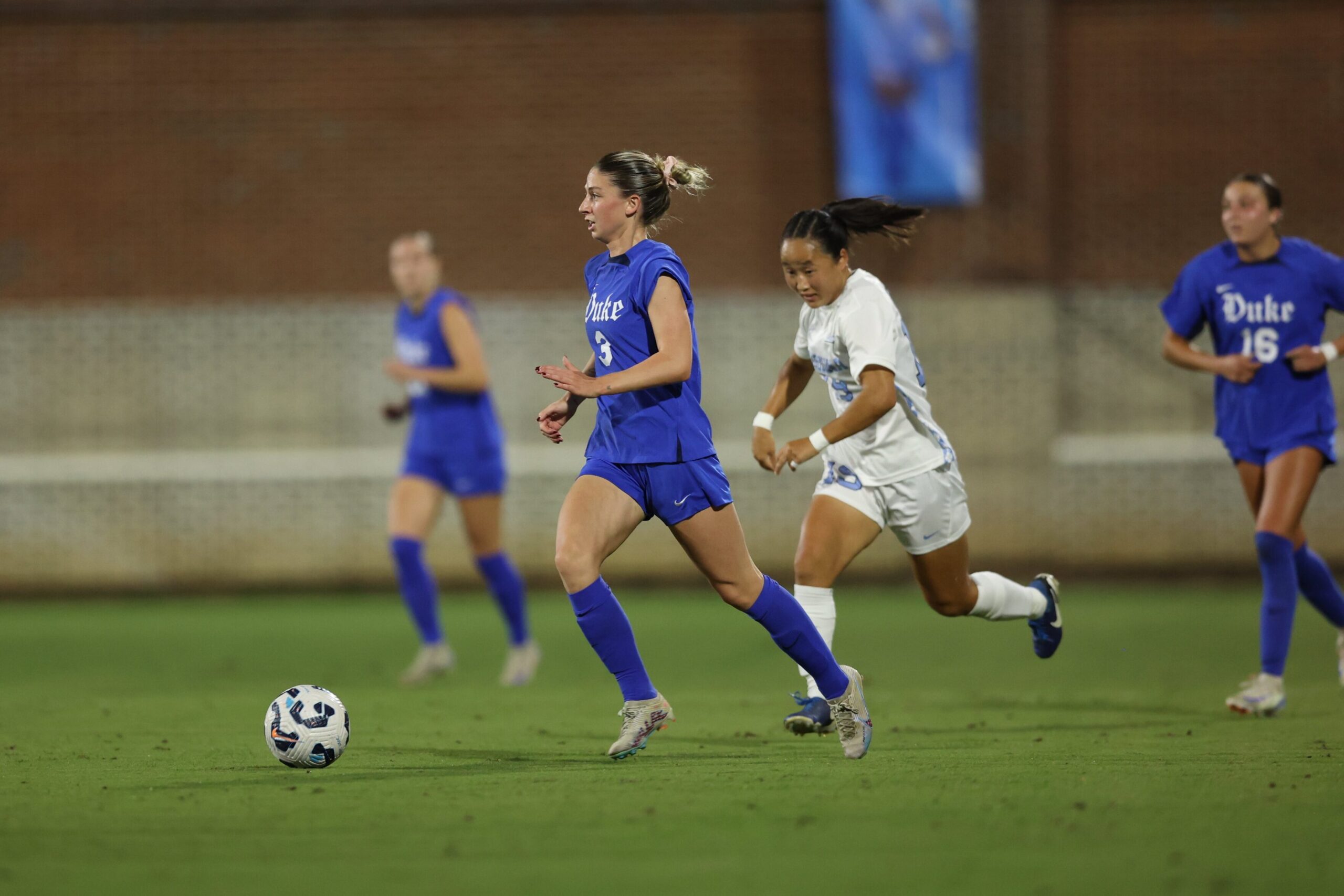
Duke soccer still dominating the ACC
With just one loss on the season, No. 1 Duke has dominated the college soccer field this year, outscoring opponents 53-10 to enter the postseason on a 15-match unbeaten streak.
Even more, the Blue Devils have done so in arguably the sport's toughest conference. A full seven of the country's Top-14 teams compete in the ACC.
Duke's journey to a first-ever College Cup title begins with Thursday's ACC tournament semifinals, where the Blue Devils will take on in-state rival and 21-time NCAA champs No. 8 UNC at 8 PM ET, with live coverage on ACCN.
If they can beat the Tar Heels for the third time this season, they'll face either defending national champion No. 6 Florida State or No. 3 Wake Forest in Sunday's tournament final.
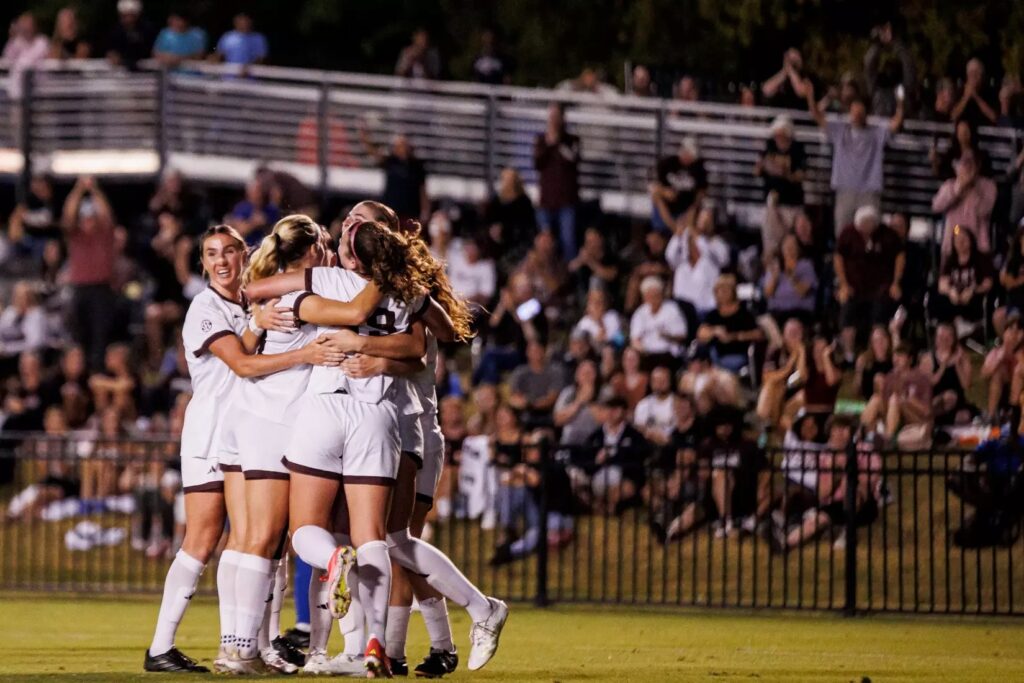
SEC sees newcomers stir the college soccer pot
Like Duke in the ACC, No. 2 Mississippi State put together a historic season, scoring their highest-ever program ranking by tearing through the SEC on their way to a one-loss regular-season finish.
While the SEC isn't quite as strong as the ACC, the top teams are well matched. Mississippi State defeated all three of the other ranked teams still in the SEC tournament — No. 5 Arkansas, No. 14 South Carolina, and No. 21 Texas — though only by a single goal in each contest.
For the Bulldogs to book their first-ever conference tournament trophy, they'll first have to beat Tennessee in Tuesday's 5:30 PM ET quarterfinal, airing on the SEC Network.
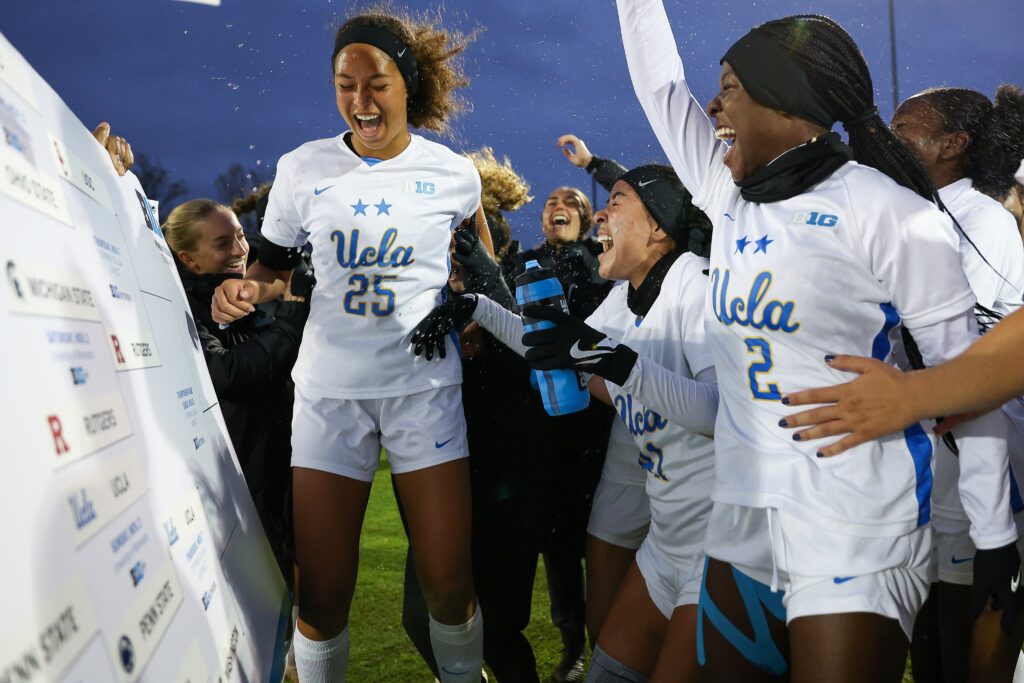
Big-time turnovers rock Big Ten college soccer
Fresh faces are ruling the Big Ten tournament, where three of the four semifinalists — No. 4 USC, No. 9 UCLA, and Washington — are conference rookies.
The former Pac-12 trio showed out this season, eclipsing traditional Big Ten powerhouses like No. 22 Penn State and 2023 title-winner No. 16 Michigan State in the race to the tournament title.
The lone conference veteran still in the mix is Rutgers, who'll take on the top-seeded Trojans for the first time this year in Thursday's 2 PM ET semifinal, before the Bruins aim to hand the Huskies a second loss at 4:30 PM ET, both airing on the Big Ten Network.
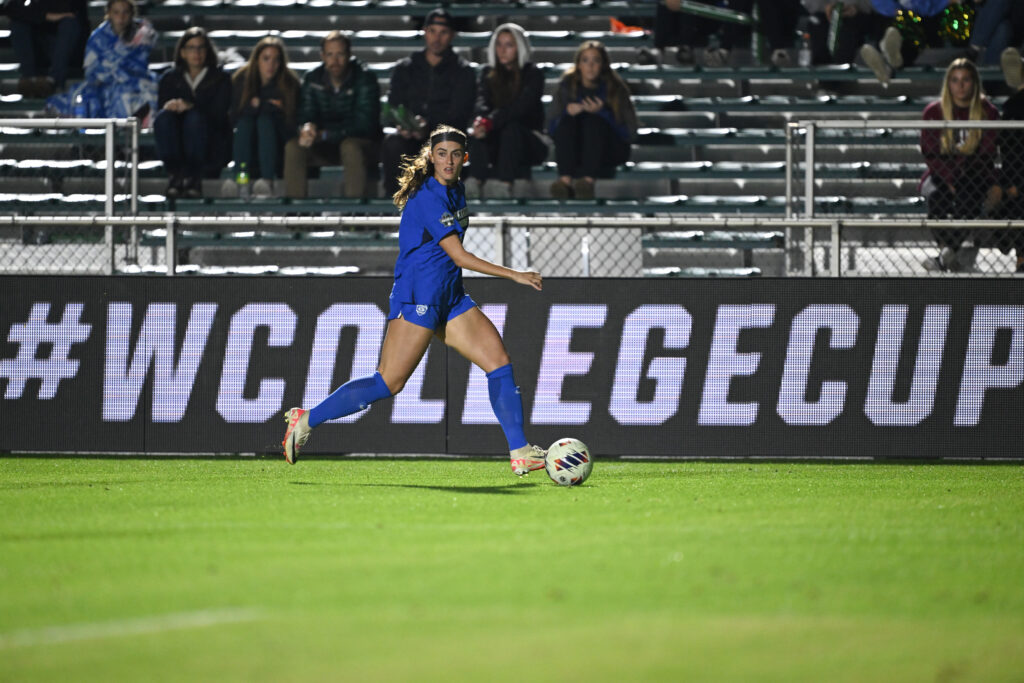
Pushing toward the NCAA championship bracket in the Big 12
The Big 12 is arguably NCAA soccer's weakest Power conference with just two ranked teams, but that doesn't mean the conference tournament is without teeth.
One of Wednesday's four semifinalists — No. 7 TCU, No. 17 Texas Tech, 2023 College Cup semifinalist BYU, or Kansas — will emerge with the Big 12 trophy and a guaranteed spot in the NCAA tournament. The other three must wait until the selection committee decides their fate on Monday, making every minute left on the pitch a vital one.
How to watch this year's NCAA soccer conference tournaments
All Power Four conference finals are set for this weekend, with the Big 12 kicking things off at 8 PM on Saturday, with live coverage on ESPN+.
Then on Sunday, the ACC and Big Ten finals begin at 12 PM ET, with the ACC airing on ESPNU and the Big Ten on the Big Ten Network.
Later, the SEC trophy will be on the line during the 2:30 PM ET final, broadcast by the SEC Network.
Florida State women’s soccer won its fourth national championship — and third in the last six years — on Monday night, with a dominant 5-1 win over Stanford.
The five goals are the most in a women’s championship game since 2003, and the most that the Cardinal have allowed since 2000. Stanford hadn’t conceded five or more goals in a game since 1996, and the 2023 team had allowed just 10 goals all season.
With the win, Florida State (22-0-1) became the first undefeated NCAA women’s soccer champion since Stanford went 23-0 in 2011. The game also marked the first time in history two undefeated teams met in the women’s College Cup final.
Stanford became the first team to score on the Seminoles in the NCAA Tournament when midfielder Maya Doms broke through in the 52nd minute, but it wasn’t enough to overcome Florida State’s offensive onslaught.
Monday night’s College Cup final was billed as an offensive-defensive battle: Stanford entered the championship allowing just 0.42 goals per game this season, while Florida State had the top scoring offense in the country, with goals in 34 straight games.
Freshman Jody Brown registered a brace, while senior Beata Olsson had a goal and two assists. Onyi Echegeni — a senior midfielder and member of the Nigerian national team — and freshman Jordynn Dudley each recorded a goal and an assist in the win.
BACK-TO-BACK GOALS WITHIN 26 SECONDS FOR FLORIDA STATE 😱
— espnW (@espnW) December 4, 2023
The Seminoles take a 2️⃣-goal lead‼️ pic.twitter.com/JQsnW8CuBx
Dudley, who scored her 14th goal of the season on Monday, earned College Cup Most Outstanding Offensive Player honors, and junior defender Lauren Flynn was named the Most Outstanding Defensive Player. The title was the first for FSU second-year head coach Brian Pensky, who succeeded legendary coach Mark Krikorian.
The Seminoles are now second all-time in Division I women’s soccer history with four national championships, surpassing Stanford and trailing only North Carolina (21).
The 2023 NCAA College Cup kicks off on Friday, with Florida State, Clemson, BYU and Stanford battling for a spot in this year’s national championship game. In many ways, these final four teams follow the arc of the regular season. In total, the semifinalists have lost just five games and two of the teams are undefeated.
Outside of reigning champion UCLA’s shocking ouster in the first round of this year’s tournament, the semifinals are full of powerhouse teams featuring numerous players with professional careers in front of them.
Nearly every starter on these four teams has a shot at the pro level, and increasingly in both the NWSL and beyond, those opportunities are not reserved for graduating seniors. Here are a few of the upperclassmen (and one underclassman) worth watching in the semifinals, some more well-known than others but all serious professional prospects.
Jasmine Aikey, Midfielder, Stanford
Stanford briefly lost their way after winning the 2019 national championship, but in 2023, they’ve been rejuvenated by the success of their recent recruiting classes. Sophomore Jasmine Aikey, the only underclassman on this list, has turned heads on her way to being named a MAC Hermann semifinalist. She leads the undefeated Cardinal in goals (11) and assists (10). And in this year’s NCAA Tournament, she’s played facilitator, currently on a four-game streak with at least one assist.
Maya Doms, Forward, Stanford
Fifth-year senior Maya Doms is one of the final connectors between the 2023 Stanford team and the squad that won the 2019 NCAA championship in her freshman year. She’s captained the team since 2022, providing both the chance-creating talent and leadership qualities that have led the Cardinal to an undefeated season. She’s scored 10 goals and registered six assists in the Stanford attack, including a dramatic strike in overtime against Nebraska last week that sent her team to the College Cup. She also recently spent time with the USWNT U-23s, teaming up with a number of players already succeeding in the NWSL.
Onyi Echegini, Midfield, Florida State
Born and raised in England and already featuring for the Nigeria national team, including at the 2023 World Cup, senior Onyi Echegini should garner heavy interest across the pond after closing out her final year of eligibility. She’s scored 15 goals and contributed four assists for the Seminoles this season. She can make runs in behind the defense and make backlines pay from distance. Echegini’s pure striking ability and poise in front of goal is also among the best in the entire college system.
Taylor Huff, Midfielder, Florida State
Junior Taylor Huff, playing in her first season with the Seminoles after transferring from Tennessee, can sometimes fall under the radar, but she has been a consistent midfield engine since her arrival. She leads the team in assists with 13, keeping the Seminoles’ vaunted attack humming with ease. Florida State has executed two big wins so far in the NCAA Tournament, most recently with Huff opening the scoring in a 3-0 defeat of Pitt in the Elite Eight.

Makenna Morris, Defender, Clemson
Don’t let senior Makenna Morris’s position fool you because she’s a proven goal-scorer. Doing it all for the Tigers, Morris has notched 10 goals this year, the second-most for a defender in NCAA history. And she didn’t reach that tally by taking lucky shots from distance. Morris has keen off-the-ball vision to find good positions in front of goal, and she’s just as capable of collecting and sinking a through-pass as she is defending on the other end. She’s the kind of fearless, multi-talented player who can propel a team to a title game.
Megan Bornkamp, Forward, Clemson
Senior Megan Bornkamp will also be crucial to the Tigers’ shot at their first-ever NCAA title game. Another player with USWNT U-23 experience, Bornkamp started her college career as a defender but has since flourished in the Clemson attack, most notably scoring the late equalizer in Clemson’s Round of 16 win over Georgia. She consistently produces high-quality scoring chances, and she has functioned as much as a playmaker as an out-and-out scorer in 2023.
Brecken Mozingo, Midfielder, BYU
Senior Brecken Mozingo is the complete package of an attacking midfielder, leading BYU’s balanced attack with a whopping 14 goals and 15 assists this season. She’s the Cougars’ primary penalty taker, going 5-for-5 on the season, and she has shown a skill for reading the field with a calm mind. Mozingo notched a goal and an assist in BYU’s furious 4-3 comeback against North Carolina in the Elite Eight, and fans can expect to see her pulling the strings in the College Cup.
Olivia Wade-Katoa, Midfielder, BYU
Senior Olivia Wade-Katoa works alongside Mozingo in perfect tandem, contributing 12 goals and eight assists of her own in 2023. None were more crucial than her strike in the second-to-last minute of the Elite Eight, giving the Cougars their improbable 4-3 victory over the Tar Heels. Wade-Katoa has the mentality of a college veteran, coming in clutch multiple times this season to provide game-winning goals. Look for her to combine with Mozingo to try to launch BYU into their second title game in the last three years.
Claire Watkins is a Staff Writer at Just Women’s Sports. Follow her on Twitter @ScoutRipley.
The 2023 College Cup is here, with three of the four No. 1 seeds in the NCAA soccer tournament making it through to the semifinals.
Top seeds Florida State, Clemson and BYU have reached the final weekend, as well as No. 2 seed Stanford. BYU advanced only after a shocking come-from-behind victory over perennial power North Carolina, which had taken a three-goal lead into the half. The Cougars responded, rattling off four unanswered goals to advance.
“I’ve never seen that in my life,” UNC coach Anson Dorrance said. “That was just an extraordinary comeback for a great team. They came after us.”
In the semifinal round, Florida State will face Clemson in a rematch of the ACC Tournament championship, which the Seminoles won 2-1. They also won their earlier meeting with the Tigers back in September. BYU will go up against Stanford in the other semifinal.
This year’s College Cup will take place in Cary, North Carolina, at WakeMed Soccer Park. The first semifinal will be played at 6 p.m. ET Friday, Dec. 1, with the second semifinal at 8:30 p.m. ET. Both games will be televised on ESPNU.
The national championship will kick off at 6 p.m. ET Monday, Dec. 5. The championship match also will be televised on ESPNU.
2023 College Cup: Schedule and results
Friday, Dec. 1:
- 6 p.m. ET – No. 1 Florida State (20-0-1) vs. No. 1 Clemson (18-3-4)
- 8:30 p.m. ET – No. 2 Stanford (19-0-4) vs. No. 1 BYU (20-2-3)
Monday, Dec. 4:
- 6 p.m. ET – TBD vs. TBD
𝐀𝐧𝐝 𝐭𝐡𝐞𝐧 𝐭𝐡𝐞𝐫𝐞 𝐰𝐞𝐫𝐞 𝐟𝐨𝐮𝐫.⚽️#WCollegeCup pic.twitter.com/l5LW0zYTvd
— NCAA Soccer (@NCAASoccer) November 25, 2023
No. 11 Santa Clara stunned No. 1 Florida Monday night to clinch the NCAA Women’s College Cup on penalty kicks.
Both teams were neck-and-neck in the opening minutes of play, ending the first half scoreless.
In the second half, the game started to open up. Florida State struck first with a curling ball from Jenna Nighswonger at the top of the box. Her spectacular finish put FSU up 1-0.
63' | Jenna comes up HUGE!!! The Noles take the lead
— FSU Soccer (@FSUSoccer) May 17, 2021
📺: ESPN 2 pic.twitter.com/agYOPt2c6J
Only 20 minutes later, Kelsey Turnbow scored an equalizer for Santa Clara off a missed back pass by FSU. With only seven minutes remaining in regulation, the game was tied at 1-1.
𝗖𝗟𝗨𝗧𝗖𝗛 🙌@KelseyTurnbow#StampedeTogether #CollegeCup pic.twitter.com/BUGy2xsGO5
— Santa Clara Women's Soccer (@SCUWomensSoccer) May 17, 2021
The 1-1 scoreline endured through two overtime periods, sending the championship to PKs.
Santa Clara buried all four penalties, outscoring FSU 4-1 from the line after the Seminoles’ first two shots hit off the post.
The Broncos shootout performance secured the school its second national championship in program history and the first in 20 years.
WHAT AN UPSET.
— Bleacher Report (@BleacherReport) May 18, 2021
No. 11 Santa Clara stuns No. 1 FSU on PK's to win the NCAA Women's Soccer National Championship 🏆
(via @SCUWomensSoccer)pic.twitter.com/vuA7XxZtLQ
Santa Clara’s upset is made even more stunning considering the Broncos played just seven regular season games this spring due to COVID-19 restrictions.